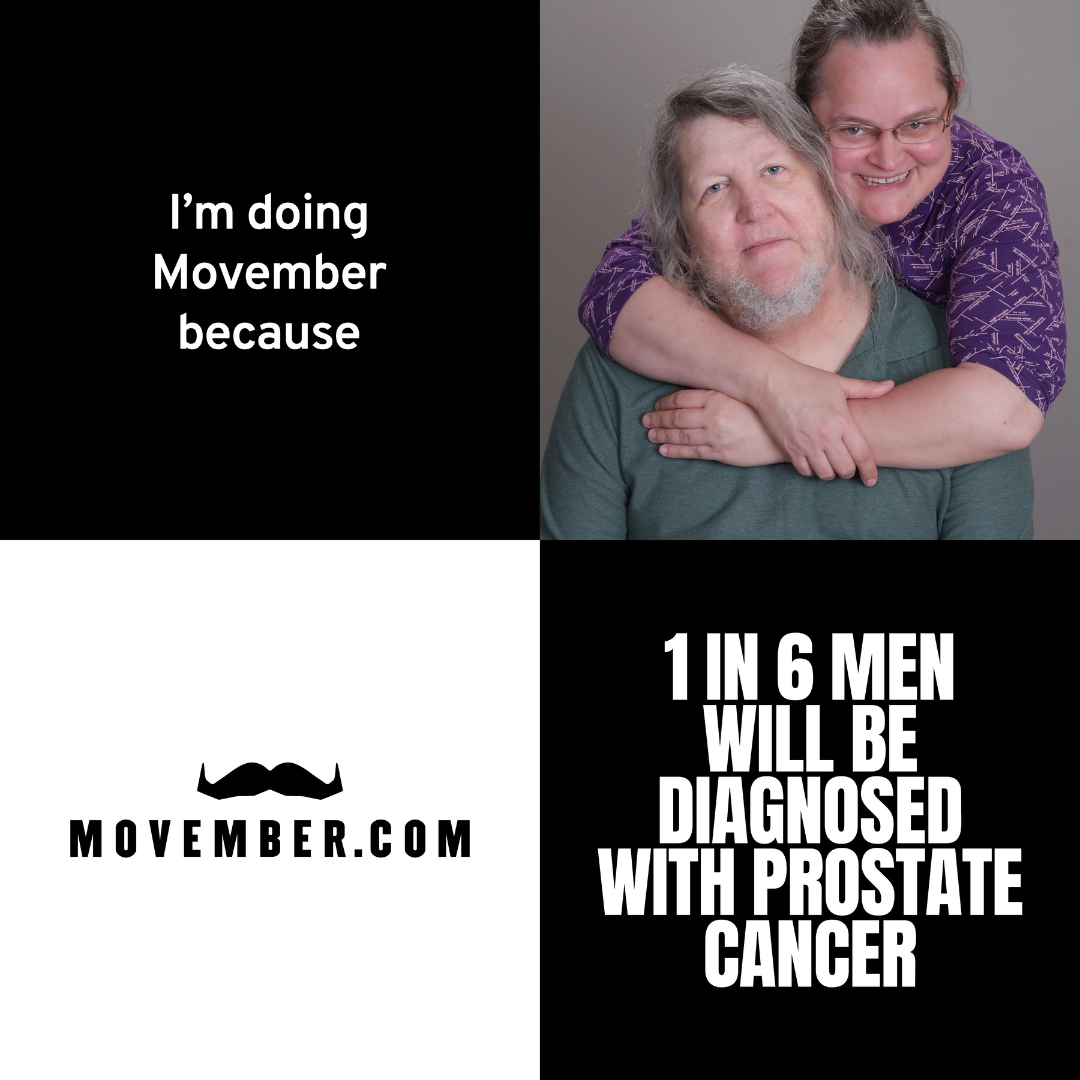Memento Movember 2023: the Motivation - Stu and the Sex Mortality Gap
by meep
Last Friday, I had my ‘soft launch’ of my Movember fundraiser for 2023, but now it’s November 3, so time to start in earnest.
Give! Give! Give!
I will be getting into my fundraising motivation in this post, but if you don’t need that, here are the places you can donate to the Movember foundation, which supports men’s health, specifically focusing on prostate cancer, testicular cancer, and men’s mental health:
- Mary Pat Campbell’s MoSpace – a place to donate at Movember itself
- My Movember facebook fundraiser – my officially linked fundraiser, if this works better for you
Those are the two official links I have via Movember, and they’ve given me “official assets” to play with to promote the fundraiser, as I’ve raised over $6,600 for the org since 2017.
Stu – the story of the missing ‘stache
One of the gimmicks around Movember is to get men involved in the fundraising by shaving off all their facial hair on October 31/morning of November 1, and then growing a mustache during November. Before 2017, I had donated to male friends’ fundraisers for Movember, and some did this, with some hilarious results.
But in August 2017, my husband Stu was diagnosed with advanced prostate cancer, and the infusion chemo he had as treatment made him lose his mustache for real. It hasn’t come back.
Stu before: (August 2017)

Stu after: (October 2021… hmmm, I think D grew)

You can see his facial hair changed quite a bit in those four years. He didn’t shave off the ‘stache in the second pic — it’s just not there. You can see the beard is less bushy. At least his eyelashes did grow back (that’s the one thing you forget to think about with chemo.)
I said “advanced prostate cancer” above, and Stu often tells people “metastatic prostate cancer” or we both say “incurable” — though that also gives a wrong idea, too. It’s incurable (currently), but treatable. Stu just came back from his regular treatment in White Plains yesterday, and it tires him.
To try to get away from the jargon, the cancer got into his bones before it was discovered, and once it gets into your bones, we’re not very good at getting it out of there. Not completely. The infusion chemo really beat back the amount of cancer in his body… but it also killed off his mustache.
So I do it in memory of Stu’s luxurious facial hair.
Ok, that’s a joke, but Stu just passed his 5-year survival point this year, and frankly, even ten years ago that would have been an amazing accomplishment given his diagnosis. I made the mistake initially of looking up survival rates for his diagnosis, not thinking of how old the papers were that I had been looking at. It said 2%. It’s not 2% now. The treatments have changed drastically in the last 20 years.
The Movember Foundation does have some projects relating to advanced prostate cancer, but their main focus, as it will have more impact, is getting men screened for prostate cancer so that it will be caught at early stages. I will write more about that in a future post. (In Stu’s case, it was just bad luck — some men just have fast-progressing cancers, just as with some women and breast cancer.)
Once Stu was diagnosed, I switched over to running my own fundraisers.
The sex gap in mortality risk
This has been an interest long before Stu’s diagnosis.
With my recent report for the Society of Actuaries (more on that in a separate post later), I updated a graph with a persistent mortality gap:

Males have an approximately 40% higher mortality risk than females in the U.S. This sort of gap is not unique to the U.S.
It got worse during the pandemic.
To be sure, prostate cancer, testicular cancer, and mental health issues are not the sole causes for the gap. With respect to cancers, of course, females have breast cancer, uterine cancer, ovarian cancer, etc. to contend with. There are other causes of death which actually, even age-adjusted, females have higher rates of death (Alzheimers is one).
That said, one must start where one can.
Some of the causes of the sex mortality gap may be unfixable, or fixes would be repugnant to our liberty. Sometimes we must let people make risky choices — in general, males suffer more violent deaths. It’s not all due to evil causes, such as homicides, but sometimes due to heroic choices, such as being firefighters.
But most of it is due to natural causes, such as differences in heart disease rates and cancer rates.
When it comes to cancer screening, and mental health treatment, I think that’s more straightforward.
Once more, with feeling
So you don’t have to scroll back up to the top, here are the donation links again:
- Mary Pat Campbell’s MoSpace – a place to donate at Movember itself
I will be doing a few more posts on the Movember fundraiser, as I did last year — at least one on prostate cancer, and one on men and suicide.
I will also give fundraiser progress reports. I do have a target of $2,000 for fundraising, mainly because I’m just not moving it. Both in 2019 and 2020 I’ve exceeded that target. So let’s exceed it again!

